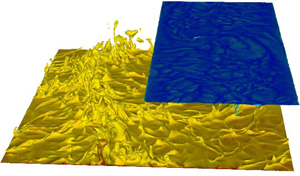Published online by Cambridge University Press: 30 September 2020

We numerically simulate three-dimensional Rayleigh–Bénard convection, the flow in a fluid layer heated from below and cooled from above, with inhomogeneous temperature boundary conditions, to explore two distinct regimes described in recent literature. We fix the non-dimensional temperature difference, i.e. the Rayleigh number, to  $Ra=10^8$, and vary the Prandtl number between
$Ra=10^8$, and vary the Prandtl number between  $1$ and
$1$ and  $100$. By introducing stripes of adiabatic boundary conditions on the top plate, and making the surface of the top plate only
$100$. By introducing stripes of adiabatic boundary conditions on the top plate, and making the surface of the top plate only  $50\,\%$ conducting, we modify the heat transfer, the average temperature profiles and the underlying flow properties. We find two regimes: when the pattern wavelength is small, the flow is barely affected by the stripes. The heat transfer is reduced, but remains a large fraction of that of the unmodified case, and the underlying flow is only slightly modified. When the pattern wavelength is large, the heat transfer saturates to approximately two-thirds of the value of the unmodified problem, the temperature in the bulk increases substantially, and velocity fluctuations in the directions normal to the stripes are enhanced. The transition between the two regimes happens at pattern wavelength around the distance between the two plates, with different quantities transitioning at slightly different wavelength values. This transition is approximately Prandtl-number-independent, even if the statistics in the long-wavelength regime slightly vary.
$50\,\%$ conducting, we modify the heat transfer, the average temperature profiles and the underlying flow properties. We find two regimes: when the pattern wavelength is small, the flow is barely affected by the stripes. The heat transfer is reduced, but remains a large fraction of that of the unmodified case, and the underlying flow is only slightly modified. When the pattern wavelength is large, the heat transfer saturates to approximately two-thirds of the value of the unmodified problem, the temperature in the bulk increases substantially, and velocity fluctuations in the directions normal to the stripes are enhanced. The transition between the two regimes happens at pattern wavelength around the distance between the two plates, with different quantities transitioning at slightly different wavelength values. This transition is approximately Prandtl-number-independent, even if the statistics in the long-wavelength regime slightly vary.